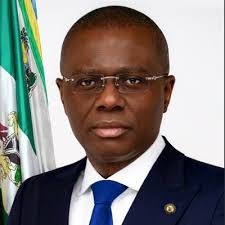Lagos State Governor, Babajide Sanwo-Olu, has disclosed that over 75% of the state’s revenue is being generated internally as the various fiscal policy measures of the government continued to yield the desired results.
The governor, who made this disclosure on Wednesday in a statement at the ongoing Afreximbank’s Trade and Investment Forum in The Bahamas, maintained that Lagos was responsible for more than a third of Nigeria’s Gross Domestic Product (GDP) as the commercial and industrial hub of the country.
According to him, Lagos State’s GDP has grown by over 50% over the past five years and thereby not making the state to solely depend on revenues from the federation account on the implementation of its projects and programmes.
The governor said: “Lagos State is one of Nigeria’s 36 states and we are responsible for more than over a third of the nation’s GDP. In fact, we have a GDP that is greater than all but seven African Countries.
“In the last five year and under my leadership, we have seen almost 50% growth in our GDP in Lagos alone. We also account for about half of the country’s total energy demand. We have over 70% of Nigeria’s foreign trade inflow into Lagos.
“And unlike most other subnational governments in Nigeria, over 75% of our revenue are generated internally as opposed to being centrally collected from the national treasury”, Sanwo-Olu added.
Similarly, he spoke on how the state government was able to construct two-level interlink projects, including the reclamation of the Atlantic Ocean to reduce land erosion, and displacement of Lagos residents, that helped to grow the State’s economy over the years.
The governor explained that the projects allowed the state to create a new mega city, the Eko Atlantic City, which today has become a global commercial hub for export-import businesses.
Sanwo-Olu further clarified: “under the leadership of my predecessor who now happened to be the president of the country, Bola Tinubu, Lagos championed two-level ambitious interlink projects.
“First, a massive reclamation of the Atlantic Ocean to reduce land loss over the course of the century to the ravaging surge of the ocean.
“Two, the construction of what is now known as the great wall of Lagos. Almost 10-kilometre long stone and concrete barrier to protect the coastline.
“That project allowed us to create a brand new city, the Eko Atlantic City, which has since then become a global model for environmentally-responsive climate action seat. This even predates the Paris Climate agenda”, the governor added.






